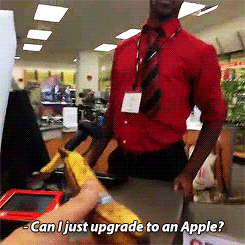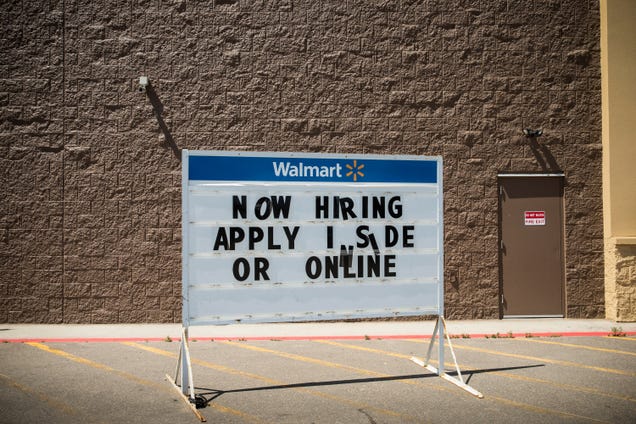What it is Really Like Working at a Convenience Store
I don’t think I’ll be alienating too many people when I say, speaking purely from personal experience, that working at a convenience store kind of sucks. At the very least, it’s not a “career path” that most follow willingly. I was no exception. I wanted to be a psychologist after college, a fact I only remember because that’s what it says on the worthless degree I earned, but those plans were foiled when I realized that I dislike the average person way too much to devote a lifetime to helping them sort out their emotional bullshit.

Jason Iannone
The type of smile that can only be achieved by graduates upon realizing they may have to play eBay Sophie’s Choice
with their kidneys to cover their student loan payment.
So, with few other job options available, I found myself mired in the drudgery of managing a convenience store for six damn years. Thankfully, about a year ago, my freelance writing and editing work picked up and I was finally able to make my escape. It was one of the happiest days of my life. Here are five reasons why …
#5. Customers Don’t Appreciate Nice Things

Louis du Mont/iStock/Getty Images
In the convenience store universe, leaving a little bit of a mess behind while hurriedly assembling the fountain sodas and faux cappuccinos that will power you through the first quarter of your awful work day is perfectly acceptable. The problem is, everyone knows that, and like any other “luxury” in life, some people can’t help but abuse it. No matter how pristine the place may be when you arrive, within minutes, expect an army of slobs to leave napkins, cups, lids, straws, and any other sort of snack food debris you can imagine all over the place. It wasn’t uncommon for someone to pull a pint of ice cream out of the freezer, decide midway through their shopping excursion that they were no longer in the mood for it, and then just leave it on the shelf to melt. Who in the hell behaves this way? I’m afraid the answer is “You do, convenience store customers of America.”

IngaNielsen/iStock/Getty Images
We had a Native-American guy on retainer to keep coming in to do the tear thing.
An especially egregious example of the public’s tendency to destroy anything shiny and new happened during the “grand reopening” of a store I worked at. In case you’re wondering, “grand reopening” is convenience store slang for “We have a new slushie machine and self-service DVD rental kiosk.” It’s exciting stuff, so naturally the big corporate heads came down to cut the ribbon and throw the customers a big party, with free food, free drinks, and photo-ready happiness available to all.

Zoonar RF/Zoonar/Getty Images
“Yes, thanks for coming, and please don’t touch me.”
It was apparent almost immediately that this was an awful idea. Customers did not respond well to a nice-looking, nice-smelling store in their proud town, and they would take us to hell to show it. They DESTROYED THE PLACE. The brunt of the damage was absorbed by that aforementioned slushie machine, which became an altar of discarded paper cups as customers fervently sampled all of the exotic flavors we stupidly labeled “new” even though we’d been serving them for years. It’s just that the machine they were housed in was so filthy after years of customer wear and tear that the roving hordes barely realized it was there until we replaced it with a prettier model.
How bad did things get? Well, even those corporate bigwigs, whose only role in this endeavor was to smile at customers and watch the happiness spread in waves, fast became too disgusted to carry on. The planned three-hour event was shut down after just one hour. Did the trashers get the point? Of course not! They were coming in for over a week afterward asking if we were still giving out “free stuff.”
Their chicanery wasn’t contained to the shopping areas, though.
#4. No One Respects a Public Restroom

Jeremy Swinborne/iStock/Getty Images
It should come as no surprise that, during Operation Total Annihilation, the store bathrooms were also completely annihilated. It wasn’t because we were giving away free stuff, though; that’s what happens to a convenience store bathroom every single day.
If somebody used the toilet for toilet purposes, it was a small miracle. On several occasions, I saw people lock themselves in the bathroom for 30 minutes at a time, not because they had just eaten 5 pounds of Taco Bell, but because they needed a nice, private place to get high. Of course, none of them would ever admit it, but when a skinny and disheveled person with glassy eyes and slurred speech comes in, spends an eternity on the john, and then leaves without buying anything, we’re guessing they weren’t just scouting for the best bargain on milk.

Scott Olson/Getty Images News/Getty Images
Spoiler alert: You’re not finding it at a convenience store.
The best part was when they’d leave behind evidence of what they were doing. One time, one of my workers (I’ll call him Biff) found a hypodermic needle stashed in the ceiling, along with the drugs it was to be used in conjunction with. So we weren’t so much a store as we were a storage place for criminal activity. Biff, by the way, was initially suspected of planting the drugs, because the average convenience store worker is so bad at cleaning that paying enough attention to notice something in the ceiling sets off all sorts of store security alarms.

Jupiterimages/BananaStock/Getty Images
“That clerk gave exact change and kept a smile the entire time … I want a blood and urine sample.”
Once the higher-ups realized that only someone with an IQ in the single digits would plant drugs and then say “HEY BOSS, LOOKIT THE DRUGS!” they set out to find the real culprit. As far as I know, they failed, because drugs were more common there than air and water, so catching one random junkie likely proved fruitless.
But drugs and needles were nothing compared to the time we found a bunch of shit in the sink. That’s not a random curse word, by the way; somebody took a giant shit in the sink. The owner of the company (I’ll call him Biff) happened to be in the store at the time, saw it, and did what any Fearless Leader would do: He immediately ran away so the hired help had to handle it. Whatever important issues he had come there to tend to were quickly forgotten about in the face of possibly having to clean the poo-poo himself. I can’t say I blame him one bit.
#3. Health Codes Are Optional if the Alternative Is Not Making Money
 monkeybusinessimages/iStock/Getty Images
monkeybusinessimages/iStock/Getty Images
The last store I worked at had fast food: roller grill, pizza, hot dogs, nachos, and other stuff with more calories than the world’s biggest cheeseburger. There were rules out the ass regarding how long stuff could stay out before getting tossed. We had to wear gloves and change them after we touched anything but food. We had to wear hats so our filthy greaseball hair didn’t sully the chow. We had to wash our arms up to our elbows after literally every activity. We had to clean the oven every night until it was spotless.
Violations meant that the Health Department would have every right to shut our ass down. They should have done that within a week, because the second obeying these rules meant that we would sell less stuff or customers would get inconvenienced for any reason, everything went out the window. It became food anarchy. Slices of pizza and warm breakfast items stayed on the shelf way past their expiration time — sometimes by hours, because the people in charge preferred to record sales than waste.

wael hamdan/iStock/Getty Images, Joe Gough/iStock/Getty Images
“Just call it ‘premium aged cheese'; some drunk’ll buy it.”
Arm washing? Glove changing? Both only happened if there were no customers waiting. In an ultra-busy, ultra-understaffed store, this almost never happened. So the same gloves usually touched multiple food items, the register, and packs of cigarettes. This was preferable, in the eyes of both customers and management, to making anybody wait ever.
Ovens would get a half-assed cleaning at best. Cleaning them took a long time, and the customers tended to bitch whenever our cleaning duties meant they had to wait in line for even one second. Even without customer influence, corners were cut on the daily. The ovens had filters in the back that needed to be scrubbed every night. One of them got stuck in its pouch and was never removed. Oh, the manager knew about it, but filters cost money, so there it stayed. As far as I know, it’s still there, gathering filth to this very day.
#2. Lottery Addicts + Solo Shifts = Nothing Gets Done, Ever

Steve Snowden/iStock/Getty Images
Despite being hotbeds of bad customers and bad situations, the majority of convenience store shifts are handled solo because it’s cheaper that way. The solo worker handles customers and then takes care of other tasks (cleaning, organizing, updating their resume) in between. The second another customer arrives, though, all floor work stops, and it’s time to ring once again.
Now, when it was somebody just buying soda, then I wouldn’t care. However, when a lottery addict showed up, forget it; I might as well have crumpled up my to-do list and set it on fire, because I wasn’t getting anything done for the rest of the day. This is everything I did when a lottery addict was in my store:
— sell tickets
— wait 10 seconds
— confirm they lost; sell more tickets
— wait 10 more seconds
— inform them they won two bucks; sell more tickets
— pray I win the lottery so I never have to deal with the lottery ever again

moodboard/moodboard/Getty Images
“Thanks for the life-changing fortune; now please choke to death on scratch-off dust.”
Not one bit of this is exaggerated; the second I would turn my back to stock cigarettes, organize shelves, or do anything, really, they’d come right at me, demanding more scratchies. Until they finally had enough and walked away (which took forever, since they were addicted and all), my productivity was shot.
Probably the worst case of all was when one full-time lottery addict (I’ll call her Biff) came into my store and stayed for three hours, just scratching and buying, over and over again. That in itself would have been infuriating, but at various points in her marathon, she was joined by OTHER addicts, all throwing an impromptu worst party in recorded history. It was a revolving door of buy-scratch-buy-scratch-buy-scratch, and I was at their mercy.
I was also at the mercy of management, who gave me heat for not finishing my work. And yet I wasn’t allowed to throw all the scratchies in the shredder so those scratching psychopaths would skedaddle sooner. They never liked my great ideas.
#1. The Customer Is Always Weird

Wavebreakmedia Ltd/Wavebreak Media/Getty Images
Want to be the ideal bad-store customer? Come in, buy your stuff, and then go elsewhere. It’s simple, it’s fast, and it will make us love you forever. Well, it would, except our career path has completely sucked us of our ability to love.
Many customers do not observe these simple guidelines and tend to make things more interesting, even when nobody asked them to. Usually, it was just them bitching and swearing because they didn’t bring their ID, and how dare I ask for one before selling them tobacco. Then they’d get in their car and drive off in a huff.

Jupiterimages/Photos.com/Getty Images
“ID.”
“What, you too?”
But others got more innovative with their strangeness, and I’m able to giggle about them now, after years of therapy. I’ve had old men pay for their purchases entirely in coins. That in itself wasn’t strange, except they stored said coins in old, wet, dirty sweat socks. More than one old man did this, mind you, so this is apparently an old man thing. When I get to be that age, I’m forcing my family to confiscate all my socks, simply so I’m never tempted to travel down that wretched road.
But at least they used quarters and half dollars. I had another woman (I’ll call her Biff) pay for a pack of cigarettes with a bag filled with nothing but pennies. They weren’t wrapped or anything, which would’ve been helpful. She then dumped them all on the counter, which was fine because I had nothing better to do than manually count 650 pennies.

Photos.com
“Hi, irate people in line! I’ll be with you in roughly 20 minutes. Please put down your knives.”
Oh, and when I pointed all this out to her, her response was pure “the customer is always right” narcissism. She simply looked at me like I couldn’t possibly be any dumber and exclaimed, “Hey, it’s money, honey!” She then took her cigarettes and left, because it’s shockingly easy to win an argument when you run away before anybody can retort.
But that’s nothing compared to the time I was working the counter and got catcalled. It’s not like a bachelorette party had just sauntered in; no, this was a group of very thuggish dudes (I’ll call them all Biff). They weren’t gay or anything, but I was sporting long, thick, wavy red hair at the time and had my back turned to them. I’m not big or muscular either, so evidently I looked feminine, and quite fetching, from behind.

Jason Iannone
I don’t see it.
I turned to look at them, and they immediately realized I was a guy. They turned beet red, made their purchases in record time, and then sped away. I guess they don’t require their women to have sexy arms, because mine being hairier than the average ape did not deter them from calling me “baby” and inviting me home with them.
I still look like that, by the way, except you’ll never see me double-fisting Budweisers again. Going forward, it’s better beer or nothing. Talk about the foibles of youth.
Sourced from: http://www.cracked.com























Recent Comments